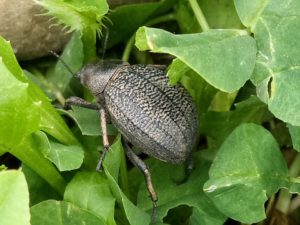Natural Ways to Control Garden Insects Pests and Disease

The life of a gardener can be pretty hectic at times there is so much that’s involved which can be challenging but these challenges do not go without rewards the goal is to continue to work at it until you get the results you desire.
Two challenges that are involved in gardening are insect pests and diseases, if not brought under control can turn any dream garden into a nightmare. I have worked on many garden projects where I have faced these issues but I kept at it until I got the desired results.
Times have changed providing new and a safer approach when seeking to eliminate garden insect pests and disease, these natural means or methods have proven to be effective especially where food crop is involved.
Our ecosystem has suffered because of the misuse or overuse of harmful chemicals that have killed off many beneficial insects, affecting wildlife along with contaminating both the air and water system. Below we will be discussing these safer approaches which are effective while protecting our environment.
What do you need to know?

- Know your plant’s
- Soil Type
- Watering Needs
- Lighting Needs
- Fertilizing Needs
- Pruning Procedures
- Crop Rotation
- Take advantage of diversity
- Disease resistant variety
- Avoid overcrowding
- Moisture
Additional Information
- Sanitizing your tools
- Keeping your garden clean
- Inspect your plants
Knowing your plants
1. Just as garden plants are diverse so are their care or maintenance it is therefore important that we get to know what those needs are and then meeting those needs to ensure that our plants are growing healthy and vibrant.
Soil Type
2. The root of a plant, survival depends on the type of soil it’s grown in, different garden plants have different soil preferences so ensure your plant is installed in the right soil type. The soil should also be healthy, free of insects and disease.
Water Requirements
3. All garden plants require water to survive but each has its water preference, some plants are high maintenance and require a good amount of water to remain healthy, and then are those which are low maintenance that can survive on very little water.
Lighting
4. All garden plants are depending upon different light levels in order to survive, whether we are growing plants outdoors or indoor some form of light is needed but garden plants lighting needs are different, some plants love full light then there are those which prefers filtered light and yet still others prefer indirect bright light. Exposing or growing your plants in the wrong lighting can and will cause issues.
Fertilizing Methods
5. The right choice and use of fertilizers are so important, by knowing your plant’s growth habits will help in determining the choice of fertilizer to be used. There are many brands on the market from synthetics to organics, slow to quick release so do your homework before making a purchase although organics are gaining more and more attention because of their safe use especially when dealing with food crops.
Pruning Procedures
6. There are so many reasons why pruning is so important from controlling a plants height to the direction in which it grows, food and flower production, etc… know what you are pruning and prune the right way because if pruning procedures are carried out wrongly can cause plant injury and even death. If you are not comfortable with pruning them hired a professional company that is certified in this area.
Crop Rotation
7. Garden insect pests and disease-causing organisms are some of the causes of the decline and death of garden plants. Disease organisms and garden insect pests overwinter in the soil waiting for the right conditions to wreak havoc on the host plant.
Don’t plant the same plant in the same spot during the following growing season but rather planting something different is good. Wait for about a year and a half before returning that plant to the same spot this will discourage the host insect pests of that plant.
Taking advantage of diversity
8. A great way to control garden insect pest is through diversity or by mixing it up, some plants are offensive to garden insect pests and will keep them at bay so incorporating these plants with your garden plants will help, this method of gardening is called companion gardening or planting which I think is so amazing.
Disease resistant variety
9. There are many cultivars that are resistant to disease when looking for plants of this sort check with your garden nurseryman or garden center rep also reading the seed package will give you a good idea.
Avoid overcrowding
10. Overcrowing can be a killer, garden plants need the proper spacing for air circulation because crowding contributes to disease and leaf drop. Before installing garden plants first know the proper spacing and give them that.
Sanitizing your tools
11. Keeping your garden tools properly sanitized will go a long way in the growth of healthy plants. To often garden plants decline because of using infected tools on healthy plants. A good way to sterilize your tools is by mixing a cup of water along with 3-4 tablespoons of bleach mix this solution well and place in a spray bottle or dip a clean piece of cloth in the water then carefully wipe the blades.
Keeping your garden clean
12. Keeping your garden clean and free of debris is so important, fallen leaves, weeds, and other debris makes the right environment to breathe disease and encourage garden insect pests, keeping your garden clean is a must for healthy plants.
I have seen what an unkempt garden can do, apart from beautifying your surroundings and providing food crops depending on the garden type, a well-maintained garden will also increase your properties value making it more attractive so keep your garden as neat and clean as possible because of the many benefits which are involved.
Inspecting your plants
13. A sure way in keeping your garden plants healthy is to have regular inspections, this was a lesson that I learned from my former director. Scouting is so important because doing regular checks will keep you ahead of the game.
The reason why many plants fall susceptible to disease and garden insect pests is because of a lack of attention, give your garden plants the inspection they need by creating a schedule and making it your business to keep a check on your garden.
Moisture
14. As discussed earlier we looked at plants watering needs, but even if your garden plants love moisture be very careful because too much moisture can and will lead to root rot. Before watering your plants check the soil first to ensure that they need water.
It makes no sense in dumping water on a plant that doesn’t need it, many garden plants have fallen sick and even died because of overwatering so get to know your plants watering needs and stick with that.
The final word
Following these listed methods will ensure your success, the great part is that these approaches are safe and will guarantee growing plants in an environment that is safe around humans and pets contributing to our ecosystem which is a win-win for all of us.
About the author
Norman loves being in the garden, both at home and for his job....
he is 'Natures Little helper' being outdoors, growing his vegetables and flowers from an early age.
Now having spent over 22 years in the profession he want to give some of his knowledge to others...
his vast array of hints and tips you will find scattered over this site will help you no end growing plants in your garden.
